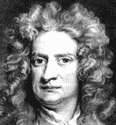Video de Chris Hemsworth
-
En este vídeo podemos observar la participación de Chris Hemsworth para una
sesión de fotos de la revista Magazine, y a su vez aprovechando a demostrar...
Isaac Newton Autobiography
Full Name: Sir Isaac Newton
Date of Birth: December 25, 1642
Place of Birth: Lincolnshire, England
Died: March 20, 1727
Place of Death: Kensington, England
Classification: Scientists & Thinkers
A passionate alchemist, chemist, mathematician, theologian, astronomer, and physicist, Isaac Newton has been dubbed by many as the ‘greatest genius’ who ever existed. His theories regarding light and sound, along with his explanations of gravity gained him international fame. He created a form of calculus and changed worldviews about geometry. In his latter years, ironically, he wrote more about religion and theology than on any other subject.
In his book Philosophiae Naturalis Principia Mathematica, he came up with the three laws of motion, which paved the way for physics and mechanics. He also staunchly supported his beliefs that light waves were particles and not waves, such as with sound. He proved this by using prisms and explained why rainbows formed through droplets of rain – it was all optical and determined by the ability of the eye to break up colors.
Isaac’s father was a farmer and died before Newton was born. Newton’s mother wanted her son to work in the family’s small enterprise. Newton abhorred the idea and was lucky enough to attend The King’s School in Grantham. When his mother had him removed from school, he began working on the farm, but returned to school on the advice of the headmaster who saw his great potential. He attended Trinity College in Cambridge, but preferred the more modern ideas of Descartes, Galileo, and Kepler. It was during his time at Trinity that he discovered mathematical theories that would later lay the groundwork for modern-day calculus. When the college shut down due to the Great Plague, he worked at home for nearly two years perfecting his new math, and working on gravitation and optics.
hen his findings on calculus were later published, Leibniz had already published Newton ’s findings ten years prior in 1684. Leibniz was accused of plagiarism and the debate was never quite resolved. By 1670, Isaac Newton had been elected Lucasian professor of mathematics. He decided to use his time lecturing on optics and investigating and discussing the properties of light and refraction. In his book entitled Opticks, which was published much later, Newton presents his findings. During his latter years, he became a member of parliament, but was not active. He also became president of the Royal Society and Master of the Mint, where he worked to prevent counterfeiting. His work at the mint earned him his knighthood









